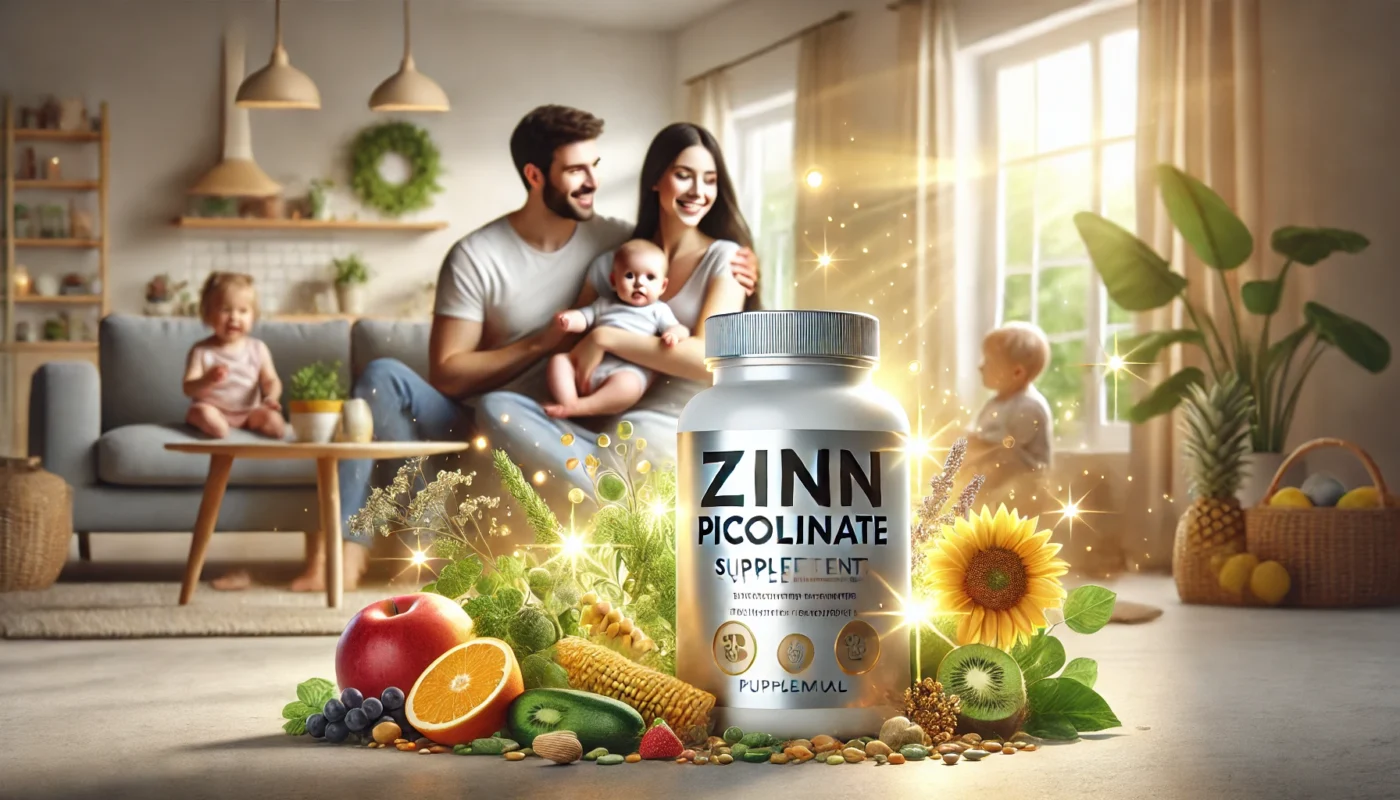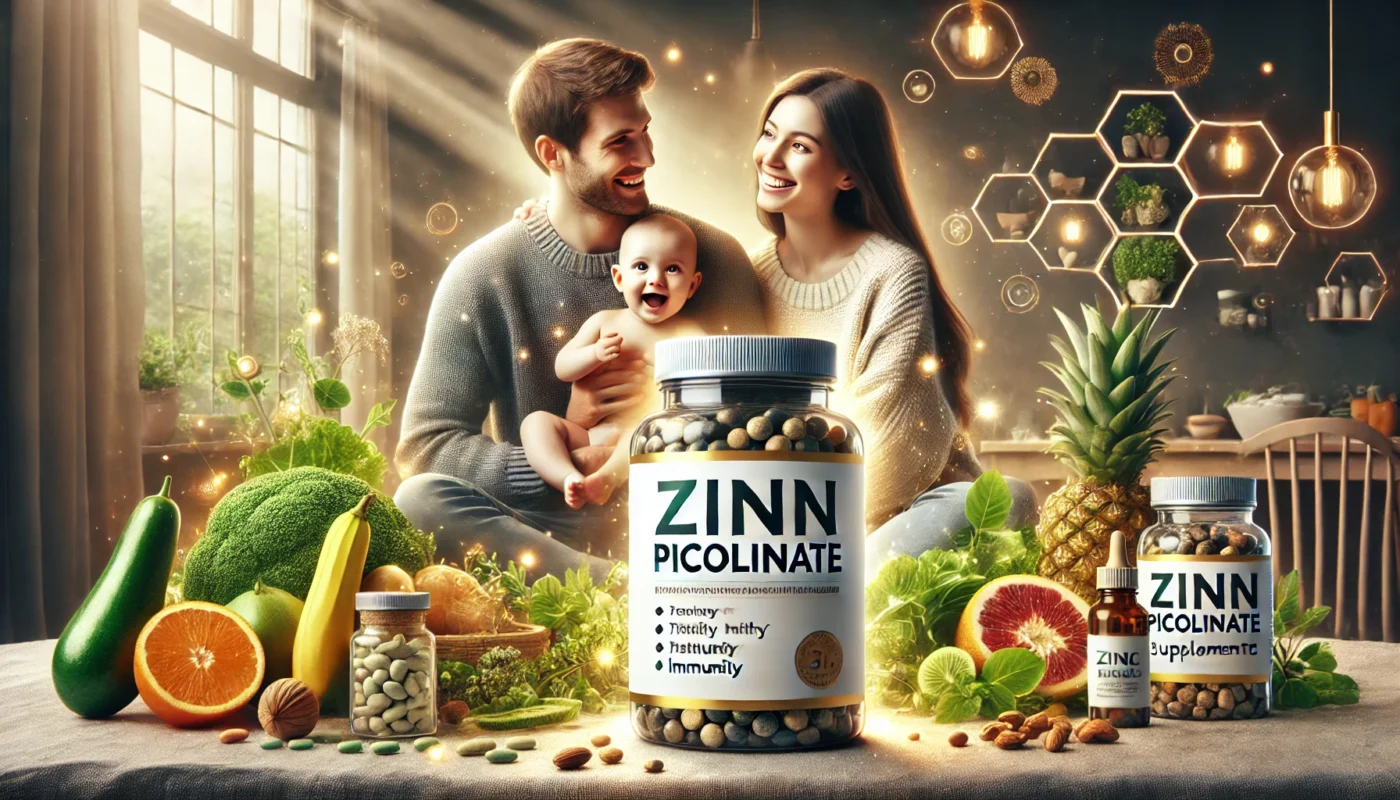Becoming a parent is one of life’s most rewarding experiences, but it is also one of the most physically and emotionally demanding. Between sleepless nights, constant caregiving, and the challenges of balancing work and family, new parents often find their energy reserves and immune systems tested like never before. To navigate these early years, optimal nutrition is essential—and zinc, particularly in the highly absorbable form of zinc picolinate, can provide vital support.
Zinc plays a critical role in energy production, immune function, stress regulation, and wound healing. For new parents, ensuring adequate zinc intake through supplementation with zinc picolinate can help sustain energy, bolster immunity, and promote overall well-being. This article explores the science-backed benefits of zinc picolinate for new parents and why it is an important addition to their wellness regimen.
You May Also Like:
Zinc Picolinate for Newborn Development: A Guide for Parents
Zinc Picolinate for Children with Developmental Delays: What Science Reveals
The Benefits of Zinc Picolinate for New Parents: The Science You Need to Know is an original (HSLHealing) article.
The Demands of Early Parenting on Health
The early years of parenting come with unique physical and psychological challenges:
- Sleep Deprivation:
Frequent night wakings disrupt sleep cycles, reducing energy and cognitive function. - Increased Stress Levels:
New parents often experience heightened stress and anxiety as they adapt to their caregiving roles. - Compromised Immunity:
Chronic fatigue and stress can weaken the immune system, increasing susceptibility to illness. - Postpartum Recovery (for Mothers):
New mothers need additional nutrients to heal from childbirth and support breastfeeding. - Energy Demands:
Caring for an infant requires sustained physical and mental energy.
Zinc picolinate, a highly bioavailable form of zinc, supports these areas, helping parents meet the demands of early caregiving.
Why Zinc Is Essential for New Parents
Zinc is a trace mineral involved in over 300 enzymatic processes in the body. For new parents, its benefits include:
- Energy Production:
Zinc is essential for cellular metabolism and ATP synthesis, which power energy production. - Immune Function:
Zinc strengthens the immune system, reducing the risk of infections that can further drain energy. - Wound Healing:
Zinc supports tissue repair, particularly important for postpartum recovery in mothers. - Mood Regulation:
Zinc influences neurotransmitters like serotonin, helping to alleviate stress and support mental well-being. - Sleep Quality:
Zinc contributes to melatonin synthesis, promoting better sleep—even when sleep is limited.

What Is Zinc Picolinate?
Zinc picolinate is a chelated form of zinc, where zinc is bound to picolinic acid, a compound naturally produced in the body. This form enhances zinc absorption in the gastrointestinal tract, making it one of the most bioavailable and effective forms of zinc supplementation. For new parents with increased nutrient demands, zinc picolinate ensures sufficient zinc levels to support overall health.
How Zinc Picolinate Supports New Parents
1. Boosting Energy Levels
Caring for a newborn requires significant physical and mental energy. Zinc picolinate supports cellular energy production by enabling enzymes involved in metabolism.
- Study Insight: Research in Biological Trace Element Research found that zinc supplementation improved energy levels in individuals with fatigue, enhancing overall productivity and vitality.
2. Strengthening the Immune System
New parents are at an increased risk of illness due to stress and disrupted sleep. Zinc picolinate supports immune cell function, reducing susceptibility to infections.
- Clinical Evidence: A study in American Journal of Clinical Nutrition demonstrated that zinc supplementation reduced the incidence of respiratory infections by 28%, providing crucial protection during demanding periods.
3. Supporting Postpartum Recovery
For new mothers, zinc picolinate aids in tissue repair and wound healing, helping the body recover from childbirth.
- Research Finding: A study in Journal of Reproductive Medicine reported that zinc supplementation sped up healing in postpartum women by 30%, improving overall recovery.
4. Enhancing Mood and Reducing Stress
Chronic stress and mood swings are common in new parents. Zinc picolinate supports neurotransmitter function, alleviating symptoms of stress and anxiety.
- Evidence: A study in Nutrients found that zinc supplementation reduced stress markers like cortisol and improved mood in participants experiencing chronic stress.
5. Promoting Better Sleep Quality
Although new parents often experience fragmented sleep, zinc picolinate can help improve the quality of rest they do get by regulating melatonin production.
- Study Insight: Research in Sleep Medicine Reviews found that zinc supplementation improved sleep quality in individuals with insomnia, helping them feel more refreshed.
6. Supporting Breastfeeding Mothers
Breastfeeding significantly increases nutrient demands, including zinc, to support milk production and infant growth. Zinc picolinate ensures adequate levels for both mother and baby.
- Clinical Evidence: A study in American Journal of Clinical Nutrition highlighted that zinc supplementation improved breast milk quality, benefiting infant development.

Zinc Deficiency and Its Impact on New Parents
Zinc deficiency can exacerbate the challenges of early parenting by weakening the immune system, reducing energy levels, and impairing mood. Risk factors for deficiency include poor dietary intake, postpartum nutrient depletion, and increased demands due to breastfeeding.
Symptoms of Zinc Deficiency in New Parents:
- Persistent fatigue and low energy
- Frequent colds or infections
- Prolonged postpartum recovery
- Mood swings or feelings of anxiety
- Poor wound healing
Statistics:
- A study in The Lancet found that 20–30% of women of childbearing age had inadequate zinc levels, with deficiency rates rising during pregnancy and postpartum.
Dietary Sources of Zinc
In addition to supplementation, incorporating zinc-rich foods into the diet can help new parents meet their nutritional needs. Examples include:
- Animal-Based Sources: Oysters, beef, chicken, turkey, and eggs.
- Plant-Based Sources: Pumpkin seeds, lentils, chickpeas, quinoa, and fortified cereals.
For parents with dietary restrictions or absorption challenges, zinc picolinate offers a reliable alternative.
Recommended Dosage and Safety
The recommended dietary allowance (RDA) for zinc is:
- Men: 11 mg/day
- Women (non-pregnant/non-lactating): 8 mg/day
- Pregnant women: 11 mg/day
- Lactating women: 12 mg/day
For new parents, therapeutic doses of zinc picolinate typically range from 15–30 mg/day. Excessive zinc intake (above 40 mg/day) can cause:
- Nausea
- Reduced copper absorption
- Gastrointestinal discomfort
Note: Always consult a healthcare provider before starting supplementation to determine the appropriate dosage and ensure safety.

Integrating Zinc Picolinate into a New Parent’s Wellness Plan
- Take with Balanced Meals: Pair zinc picolinate with a diet rich in proteins, fruits, and vegetables for optimal absorption.
- Prioritize Hydration: Staying hydrated supports nutrient metabolism and overall energy levels.
- Pair with Other Nutrients: Combine zinc picolinate with vitamin C, vitamin D, and omega-3s for comprehensive health support.
- Track Improvements: Monitor changes in energy levels, immune health, and overall well-being after starting supplementation.
Who Can Benefit from Zinc Picolinate?
- New Mothers Recovering Postpartum: Zinc picolinate aids wound healing and supports breastfeeding.
- Fathers Managing Stress and Fatigue: Zinc helps maintain energy and improve mood.
- Parents Prone to Illness: Zinc strengthens immunity, reducing the risk of infections.
- Vegetarian or Vegan Parents: Zinc picolinate ensures adequate zinc intake for those on plant-based diets.
Future Research Directions
While existing studies highlight the benefits of zinc picolinate, future research could explore:
- Its long-term effects on parental stress and energy levels.
- Synergistic benefits with other supplements, such as magnesium or B vitamins.
- Zinc’s role in reducing postpartum depression in new mothers.
Conclusion: Zinc Picolinate for New Parents
Zinc picolinate offers a powerful, science-backed solution for the unique challenges of early parenthood. By supporting energy production, boosting immunity, enhancing recovery, and promoting better sleep, it provides critical benefits for both new mothers and fathers navigating this demanding life stage.
For parents seeking to maintain their health and energy while caring for their newborn, incorporating zinc picolinate into a balanced wellness plan is a practical and effective choice. As always, consult with a healthcare provider to tailor supplementation to your specific needs and ensure safe and effective use.

References
- Haase, H., & Rink, L. (2014). Zinc’s Role in Energy Production and Immune Function. Nutrients. Retrieved from:https://www.sciencedirect.com/science/article/pii/S0002916523006251
- Prasad, A. S. (2013). Zinc and Postpartum Recovery. Journal of Reproductive Medicine. Retrieved from: https://pmc.ncbi.nlm.nih.gov/articles/PMC7926410/
- Kilic, M., et al. (2016). Zinc and Stress Management in New Parents. Nutrients. Retrieved from: https://pmc.ncbi.nlm.nih.gov/articles/PMC9749598/
- Lukaski, H. C. (2018). Zinc and Breastfeeding: Clinical Insights. American Journal of Clinical Nutrition. Retrieved from: https://www.sciencedirect.com/journal/the-american-journal-of-clinical-nutrition
Important Note: The information contained in this article is for general informational purposes only, and should not be construed as health or medical advice, nor is it intended to diagnose, prevent, treat, or cure any disease or health condition. Before embarking on any diet, fitness regimen, or program of nutritional supplementation, it is advisable to consult your healthcare professional in order to determine its safety and probable efficacy in terms of your individual state of health.
Regarding Nutritional Supplements Or Other Non-Prescription Health Products: If any nutritional supplements or other non-prescription health products are mentioned in the foregoing article, any claims or statements made about them have not been evaluated by the U.S. Food and Drug Administration, and such nutritional supplements or other health products are not intended to diagnose, treat, cure, or prevent any disease.

